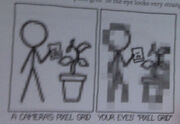Navigation
Install the app
How to install the app on iOS
Follow along with the video below to see how to install our site as a web app on your home screen.
Note: This feature may not be available in some browsers.
More options
-
This forum is strictly intended to be used by members of the VS Battles wiki. Please only register if you have an autoconfirmed account there, as otherwise your registration will be rejected. If you have already registered once, do not do so again, and contact Antvasima if you encounter any problems.
For instructions regarding the exact procedure to sign up to this forum, please click here. -
We need Patreon donations for this forum to have all of its running costs financially secured.
Community members who help us out will receive badges that give them several different benefits, including the removal of all advertisements in this forum, but donations from non-members are also extremely appreciated.
Please click here for further information, or here to directly visit our Patreon donations page. -
Please click here for information about a large petition to help children in need.
You are using an out of date browser. It may not display this or other websites correctly.
You should upgrade or use an alternative browser.
You should upgrade or use an alternative browser.
Why is 70 used in angsizing?
- Thread starter Kulf_Boba
- Start date
- 32,776
- 37,946
A similar thread like this was made before, the assumption comes from Minecraft, as for why, DontTalkDT basically sums it up here
Basically this is what he said:
"The human eye works in very strange ways. Despite the eyes technically having such a large FoV if one used a camera with such a large FoV to make pictures the pictures would look unnatural for us. (See Fisheye Lens)
For a long time there was a rule of thumb amongst photographers that a lens that produces a picture that looks "natural" to us has a FoV of around 40 degree. In recent trends that may change, though. For example the iPhone X uses a camera with a 65d egree horizontal FoV and still looks natural.
(Source: "How To" by Randall Munroe)
Not sure where 70 degree exactly came from. It's one of the OBD artifacts in our calcs. It doesn't seem too wrong, though, given the above."
"The thing is, things will be drawn or recorded in the way a camera perceives it, as the result is supposed to be a good looking picture. The result is not a visual stimuli send directly into our brain, where a FoV matching our eyes would look better.
For instance, our eyes also perceive things in a very different way regarding resolution:

However, nobody would draw a picture in the way our eyes actually see it. Everybody would draw it like a camera does."
If you have further questions, DontTalkDT should be more than happy to answer your questions on his message wall.
Basically this is what he said:
"The human eye works in very strange ways. Despite the eyes technically having such a large FoV if one used a camera with such a large FoV to make pictures the pictures would look unnatural for us. (See Fisheye Lens)
For a long time there was a rule of thumb amongst photographers that a lens that produces a picture that looks "natural" to us has a FoV of around 40 degree. In recent trends that may change, though. For example the iPhone X uses a camera with a 65d egree horizontal FoV and still looks natural.
(Source: "How To" by Randall Munroe)
Not sure where 70 degree exactly came from. It's one of the OBD artifacts in our calcs. It doesn't seem too wrong, though, given the above."
"The thing is, things will be drawn or recorded in the way a camera perceives it, as the result is supposed to be a good looking picture. The result is not a visual stimuli send directly into our brain, where a FoV matching our eyes would look better.
For instance, our eyes also perceive things in a very different way regarding resolution:

However, nobody would draw a picture in the way our eyes actually see it. Everybody would draw it like a camera does."
If you have further questions, DontTalkDT should be more than happy to answer your questions on his message wall.
Last edited:
Similar threads
- Replies
- 0
- Views
- 322
- Replies
- 0
- Views
- 311
- Replies
- 6
- Views
- 715
- Replies
- 230
- Views
- 12K